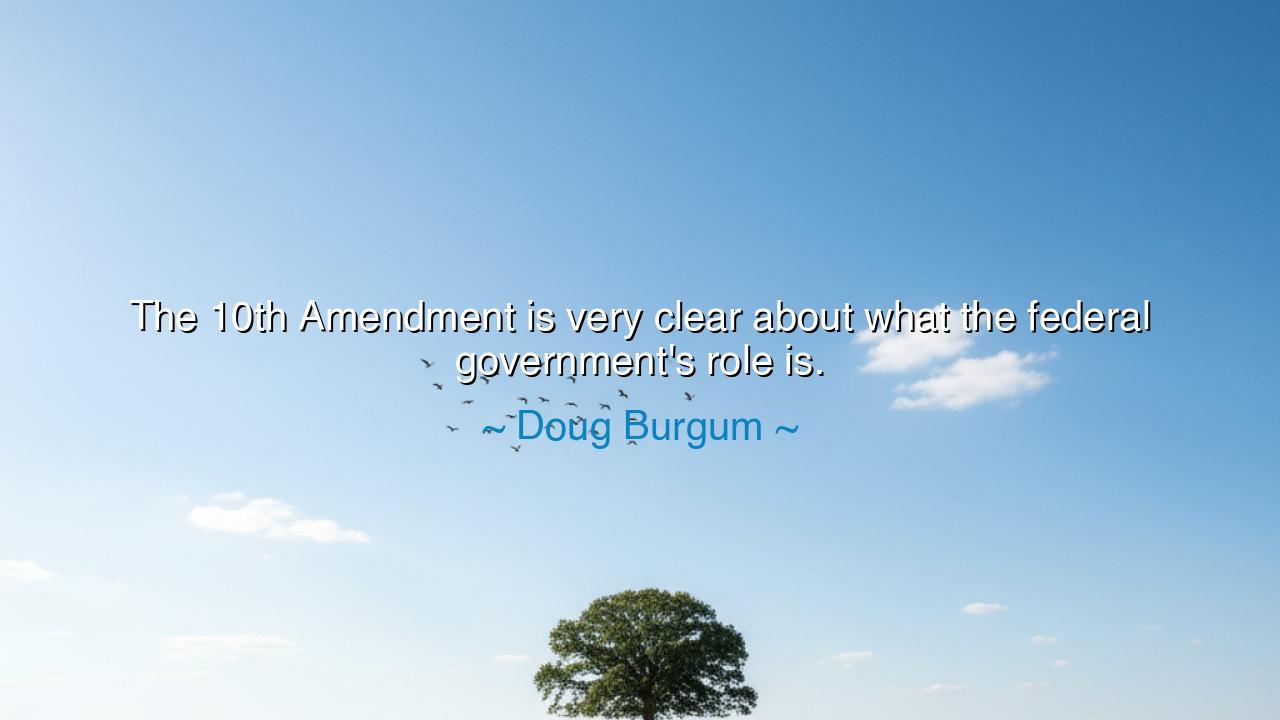
The 10th Amendment is very clear about what the federal






Listen well, children of law and liberty, and ponder the words of Doug Burgum, a voice calling us back to the ancient wisdom of governance: “The 10th Amendment is very clear about what the federal government's role is.” In this declaration lies a meditation upon the delicate balance of power, the sacred division of authority, and the eternal dance between the collective and the individual. The 10th Amendment, etched into the foundation of the United States, is not merely ink on parchment; it is a guiding principle of restraint and clarity, a reminder that the weight of governance must never crush the spirit of local self-determination.
In the time when the founders of America crafted the Constitution, they wrestled with the question: how may power be granted without corrupting freedom? The 10th Amendment arose as a beacon, asserting that all powers not delegated to the federal government, nor prohibited to the states, are reserved to the states or to the people. It is a testament to humility in governance, a recognition that central authority must not overreach, and that local wisdom often governs better than distant decree. Burgum’s words remind us that this clarity was intentional, a safeguard for liberty itself.
History offers a mirror to this principle. Consider the crafting of the New Deal in the 1930s: the federal government, responding to calamity, expanded its reach dramatically. While many programs lifted the nation from despair, critics pointed to the creeping power over states’ rights and local governance. This tension reflects the very spirit of the 10th Amendment—a warning that the locus of power must be respected, lest freedom be eroded even by benevolent intent. Burgum’s invocation of the amendment is thus a call to vigilance, a reminder that clarity in the scope of authority preserves both justice and liberty.
The 10th Amendment also teaches a deeper lesson about responsibility. Just as the federal government must respect its bounds, so too must citizens recognize their duty within their local communities and states. In the ancient city-states of Greece, autonomy allowed innovation, civic engagement, and justice to flourish in ways that centralized empires often stifled. Power wisely distributed fosters accountability, encourages participation, and nurtures the flame of self-governance in every heart.
Consider the modern example of education policy in the United States. While the federal government sets broad guidelines, the control of curricula, school standards, and local governance rests largely with states and local districts. This system, when respected, empowers communities to shape learning according to local values and needs, honoring the principle that subsidiarity—the idea that decisions are best made close to those affected—is a cornerstone of just governance. Burgum’s words echo this ancient wisdom, urging respect for the boundaries of authority.
The lesson, therefore, is one of balance and discernment. Understand the limits of centralized power, cherish the autonomy of local institutions, and recognize that freedom flourishes when governance is exercised with clarity and restraint. The 10th Amendment is more than legal text; it is a philosophy, a guide to preserving liberty while maintaining order. It calls us to honor the principle that true governance is measured not by expansion, but by wise and just limitation.
Practical actions arise from this insight: study the Constitution and the 10th Amendment carefully; participate actively in local governance and community decision-making; remain vigilant against overreach, whether by distant authorities or centralized institutions; and cultivate a mindset that respects both law and liberty, understanding that freedom requires engagement as much as protection. By doing so, one becomes not merely a subject of the law, but a steward of the enduring principles upon which a just society rests.
Thus Burgum’s voice, though contemporary, speaks with the weight of the ancients: a call to understand boundaries, to honor the wisdom of measured authority, and to act with responsibility in the spheres where power is entrusted. Let his words guide every citizen, reminding us that clarity, restraint, and respect for the proper role of government are essential to the flourishing of both communities and souls alike.
If you wish, I can also craft an even more epic, emotionally resonant version, written for dramatic narration, emphasizing the heroic defense of liberty and the moral weight of the 10th Amendment. Would you like me to do that?






AAdministratorAdministrator
Welcome, honored guests. Please leave a comment, we will respond soon